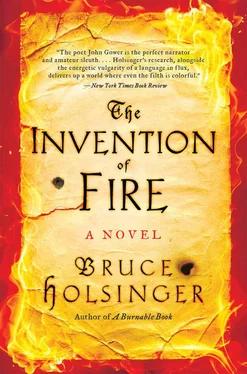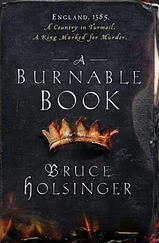Bruce Holsinger - The Invention of Fire
Здесь есть возможность читать онлайн «Bruce Holsinger - The Invention of Fire» — ознакомительный отрывок электронной книги совершенно бесплатно, а после прочтения отрывка купить полную версию. В некоторых случаях можно слушать аудио, скачать через торрент в формате fb2 и присутствует краткое содержание. Год выпуска: 2015, Издательство: HarperCollins, Жанр: Исторический детектив, на английском языке. Описание произведения, (предисловие) а так же отзывы посетителей доступны на портале библиотеки ЛибКат.
- Название:The Invention of Fire
- Автор:
- Издательство:HarperCollins
- Жанр:
- Год:2015
- ISBN:нет данных
- Рейтинг книги:3 / 5. Голосов: 1
-
Избранное:Добавить в избранное
- Отзывы:
-
Ваша оценка:
- 60
- 1
- 2
- 3
- 4
- 5
The Invention of Fire: краткое содержание, описание и аннотация
Предлагаем к чтению аннотацию, описание, краткое содержание или предисловие (зависит от того, что написал сам автор книги «The Invention of Fire»). Если вы не нашли необходимую информацию о книге — напишите в комментариях, мы постараемся отыскать её.
The Invention of Fire — читать онлайн ознакомительный отрывок
Ниже представлен текст книги, разбитый по страницам. Система сохранения места последней прочитанной страницы, позволяет с удобством читать онлайн бесплатно книгу «The Invention of Fire», без необходимости каждый раз заново искать на чём Вы остановились. Поставьте закладку, и сможете в любой момент перейти на страницу, на которой закончили чтение.
Интервал:
Закладка:
Peter Norris stood at the end of a loose middle rank, angled against the wall, his eyes downcast, his shoulders slumped, a man already resigned to his fate. His cheeks and chin had been shaved to the skin. The hangman likes a clean neck.
At the west end of the hall was the mayor’s bench, positioned on a movable dais raised several feet above the floor. Brembre himself sat in the middle, with the city’s aldermen stretched beside and beneath him along the adjacent tables, all gazing down at the lower benches and the accused, who came forward to the bar one by one to answer to the charges or suits against them. The area before the bench was separated from the crowd by a low wooden barrier extending around the three sides, keeping the rabble at bay.
Always some useful surprises in the mayor’s court, and in former years I had attended nearly every week, eager to gather what buds I could, though that day the civil matters offered little that was not routine. Aliens admitted to the freedom of the city, a dispute over the capture and cooking of an errant street pig, a wife and husband sent to the pillory for tearing a neighbor’s hood. The parties and the witnesses were demonstrative, and the arguments could be heated, but the court’s decisions brooked no argument. The matters heard in the first hour were all too minor for any kind of appeal, with the mayor’s judgment taken as final. Brembre looked both bored and in a hurry, surely eager to return to the more significant matters under debate up the river in Westminster. Parliament had opened the day before, and the mayor had little patience for the squabbles of ward and parish when the future of the kingdom was at stake.
It was nearing the hour of eleven by the time the court came to the criminals. The bailiff called out the names of the jury members, gathered from various wards for that week’s service, with the sentences tailored to fit the crime or violation in question. A grocer accused of leavening his spices would forfeit his shop to the city for the space of a year. Others would go to the pillory for the minor theft of an egg or the selling of bad beef.
Yet for certain of these Londoners life and limb were at stake. The Guildhall’s work here was quick and cruel, despite the moderating influence of the jury. Two horse thieves would hang that very afternoon, while a Dutchman who had twice escaped from Newgate was sentenced to the severing of his left leg below the knee. Still another man, a blacksmith barely out of his apprenticeship, would lose his hand, and with it his livelihood, for striking the alderman of Cripplegate Ward in a dispute over a property boundary. The alderman preened happily at his victory, and the thought of the axe.
The saddest aspect of the law’s application in such cases, sadder to me the older I grow, is the pathetic reactions of the families of those convicted. You could hear their sobs, the loud anguish from Guildhall Yard as each sentence was delivered within and announced by the mayor’s caller outside. The mother of one of the horse thieves, rushing for her condemned son, held back inside the door by a ward constable and struggling in his arms. The fresh young wife of the smith, a hooded rose who would never again feel her husband’s strong grip at her waist. The Guildhall practiced a justice of arbitrary cruelty, made worse in the last year by a departing mayor with something to prove.
Eventually Peter Norris’s matter was called. The tension increased, the aldermen exchanging looks around the bench, as Norris’s former position in the city government was well known. The bailiff read out his offense in his bureaucrat’s dull hum.
“Be it known to all present that on the Thursday last, the eve of Michaelmas, in the tenth year of the reign of King Richard II, Peter Norris, vagrant, did feloniously remove two gold cups, a silver ewer, four purses of nobles and half nobles, and other smaller goods from the shop of Master Henry Gibbe, guildsman in the parish of St. Michael Paternoster, and that upon being spied by the curate of that parish, viz. Richard Hering, said Peter Norris, vagrant, did then flee through the streets, with four men of the parish in pursuit, viz. Peter Blome, John Braham, John Refham, and William le Tabler, and that upon reaching Bishopsgate said Peter Norris, vagrant, was apprehended by said men of the parish, with said gold cups, ewer, purses, etc. on his person and in his possession, by which evidence . . .”
The bailiff’s account went on to detail Norris’s arrest and imprisonment, along with his futile repentance before his jailers. In addition to the theft, Norris was being pinned with vagrancy: the ultimate insult for a former ward beadle, and a charge that would render any leniency on the mayor’s part all the more unlikely.
The proceeding went quickly, with the curate and two of the four parishioners giving their testimony. No facts were in dispute, the verdict rendered with little ceremony. Norris’s face had gradually whitened as his doom became clear, and when the time came for him to speak he had been reduced to a quivering mess, his skin an ashen grey, his voice rasping as he attempted to utter some words of regret. He stammered once, again, then clamped shut his lips and eyelids.
“Speak up then,” said the bailiff, poking Norris in the gut with his rod. “Have you any words to say for yourself, Norris?”
“Only, my lords . . .” His head swiveled from side to side, owl-like, though his eyes remained closed. “Only that what I did was done of out the barest need, and done for my son, though I am dreadful sorry for the theft, dreadful sorry, my lords. But I couldn’t let him starve, not young Jack. Couldn’t bear to see him-”
“We are no fellows of yours, Norris,” said Brembre, half standing and leaning forward from the bench, unable to resist a final show of superiority over the diminished man. “Regret will buy you nothing here.”
Norris lifted his chin. “Then perhaps I might use another coin, your lordship, for I have information for the aldermen of the city,” he said quickly. “It concerns the recent killings, the bodies in-”
“We’ll hear none of your lies, Norris,” said Brembre.
“Yet I have a witness, my lords!”
“You have nothing, ” the mayor snarled, and the chamber went silent. Brembre spoke into the quiet. “Now still your tongue or it will be sliced from your mouth this very hour.”
Another moment of silence, then, “With respect, Lord Mayor,” someone said from the dais, “should we perhaps listen to what the man has to say?”
All heads turned to the speaker. He was, I saw to my delight, William Rysyng, prior of Holy Trinity and the alderman of Portsoken Ward. It was a peculiar arrangement, though one in effect for many years: ever since King Henry I had granted the entirety of Portsoken to the priory by the city’s east gate, the prior had served ex officio as the ward’s alderman. While Rysyng’s two most recent predecessors had designated worldly men to serve in their places, deeming the civic office unfit for the sober life of an Augustinian canon, Rysyng had embraced his urban duties, involving himself in city affairs with an almost perverse glee. He was the only clergyman among the city’s aldermen, who generally served shorter terms. Not Rysyng. Going on his ninth year in office, the prior was a fixture at the Guildhall, exercising a power within the city bureaucracy surpassed only by the mayor’s own.
The prior was seated to the mayor’s left, his hand held up to delay the proceedings. It was not uncommon for such ripples to move through the mayor’s court for one reason or another: a clerical question, a technical knot, a last-minute bribe.
Brembre turned on Rysyng with a dog’s snarl. “Not in this hall, Reverend Father. Not while I am mayor of this city. Is that understood?”
Читать дальшеИнтервал:
Закладка:
Похожие книги на «The Invention of Fire»
Представляем Вашему вниманию похожие книги на «The Invention of Fire» списком для выбора. Мы отобрали схожую по названию и смыслу литературу в надежде предоставить читателям больше вариантов отыскать новые, интересные, ещё непрочитанные произведения.
Обсуждение, отзывы о книге «The Invention of Fire» и просто собственные мнения читателей. Оставьте ваши комментарии, напишите, что Вы думаете о произведении, его смысле или главных героях. Укажите что конкретно понравилось, а что нет, и почему Вы так считаете.












